Yet another happy Solus user spreading the word
Note: While I was writing this, Solus 4.0 ?Fortitude? has been released. The changes are mostly subtle but since literally hundreds of distro hoppers have been asking around for literally years now: Yes, Solus 4 is a thing now. It?s a rolling release distribution so the number ?4? mostly serves as a symbolic milestone, including a ISO-refresh.
Note 2 (June, 24th 2019): Recently, Ubuntu developers announced that they will deprecate (=abandon) 32bit support in the near future. There has been lots of discussion about this controversial decision and it seems that 32bit computers are now considered ?outdated? for whatever reasons. Solus, a serious contender to become one of the top 5 ?standard? distributions, will continue to provide multilib support, as stated by one of the developers:
 Photo by JOSHUA COLEMAN on Unsplash
Photo by JOSHUA COLEMAN on Unsplash
I?m addicted to Linux-based operating systems. You know that feeling, don?t you? I think it?s totally normal. Software freedom is great and thinking about the concept alone gets me high.
But there was a time of darkness during my journey as a free software addict?
When Xubuntu 12.04 came close to reaching its EOL date in April 2015, I began searching for another distribution that suited my needs.
I tried literally dozens of linux distributions over the course of three years but not one was as perfect as Xubuntu 12.04 had been for me. In the meantime I upgraded Xubuntu to 14.04 but I was disappointed.
The top candidates as a replacement for my now barely functional Xubuntu 14.04 partition were Manjaro OpenRC, Slackware and OpenBSD.
The init system wars were in full force at that time and systemd was established as the new de facto standard despite being far from ?stable?.
I was looking for an alternative to this mess.
To make a long (and mostly boring) story short: I didn?t really find an alternative over the course of many years.
My distro hopping addiction was in full force and I can?t recount how many times I installed yet another Linux distribution, hoping that it would be the one. Life was unbearable and I was honestly thinking of switching back to MacOS again ??
But then I found Solus and it took me less than an hour playing around with the live environment to realize: This is it!
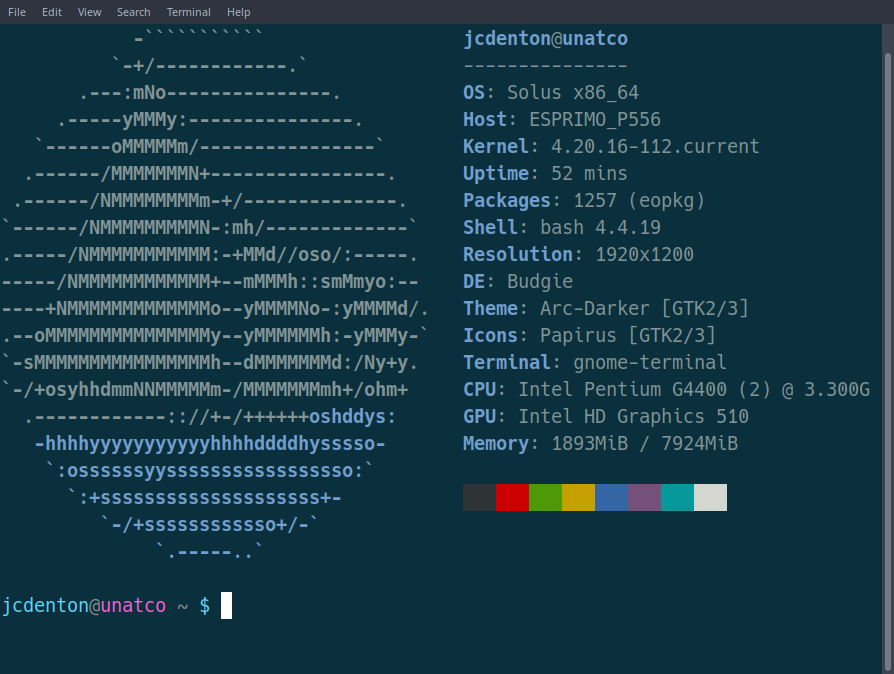 The more or less useful ?neofetch? output for my Solus installation.
The more or less useful ?neofetch? output for my Solus installation.
Although it?s quite the opposite of what I initially hoped for, Solus fulfills all my needs, exceeds all my expectations and has helped me cure my distro-hopping addiction with a few simple, yet powerful concepts.
By the way, I?m using Budgie as the desktop environment.
The following article is not meant to be an objective review of the Solus operating system. It?s all praise and not in any particular order. I?m aware that there are several downsides for a specific breed of power users but for me that?s irrelevant.
Great Performance Out Of The Box
Solus is fast. Period.
I?m using a mid-range office PC from 2015 with a G4400 ?Skylake? CPU, 8GB of DDR4 RAM and a cheap SSD. Solus blows all the other tested operating systems out of the water.
Well, not all of them. Puppy Linux or Clear Linux or some of the minimalistic distributions are even snappier than Solus. But they lack some or many features that I depend on, mainly usability enhancements that Budgie inherited from the GNOME code base.
My system boots in under five seconds excluding BIOS shenanigans and the GRUB kernel selection.
It?s amazing that such a polished desktop environment is fast and stable at the same time. There are many other good-looking DEs out there and I tried them all. But with Budgie on Solus I don?t have to worry about jittering window animations or screen tearing or any other inconveniences that seem to come with distributions focusing on superficial improvements alone.
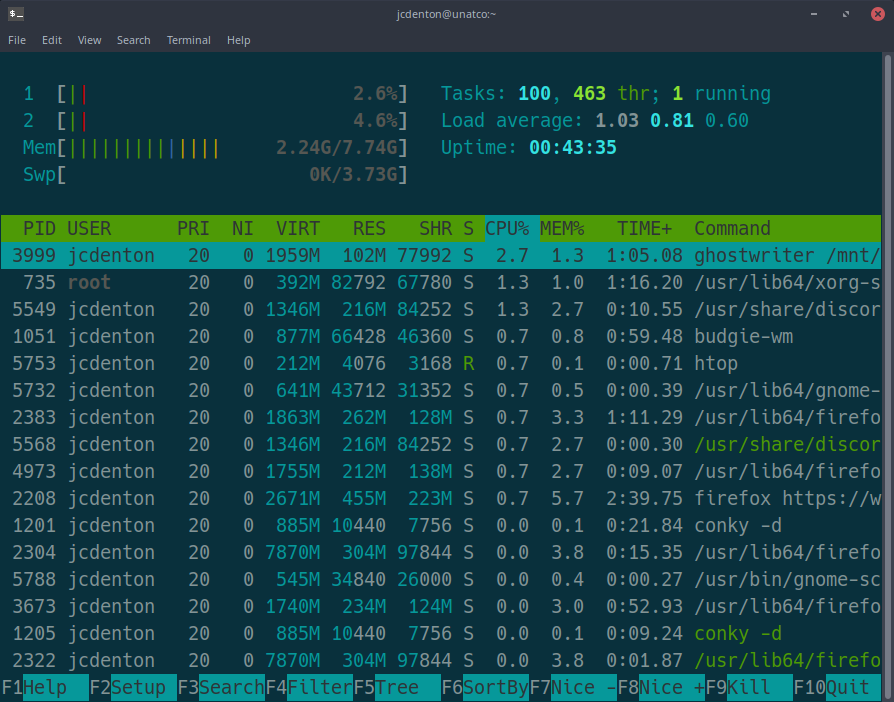 RAM & CPU usage while writing this article with a couple of apps running in the background.
RAM & CPU usage while writing this article with a couple of apps running in the background.
Michael Larabel from phoronix.com regularly benchmarks and compares Linux distributions. Solus comes out ahead quite often but see for yourself:
https://www.phoronix.com/scan.php?page=article&item=intel-8086k-linux (Benchmark from July 2018)
https://www.phoronix.com/scan.php?page=article&item=void-linux-2018 (Benchmark from November 2018)
(I?m currently writing another article explaining how to get the most performance out of Solus with a bit of tinkering. Stay tuned, especially if you?ve felt the performance impact of the recent Spectre mitigations.)
Beautiful By Design
Budgie is a simple desktop environment. The lack of configuration options was a bit disappointing at first. I was used to spending hours upon hours of fiddling with Xfce?s internals to achieve somewhat satisfactory results.
I thought I?d miss all the levers and knobs and buttons. But I didn?t. After almost two years of using Solus as my main operating system I still don?t.
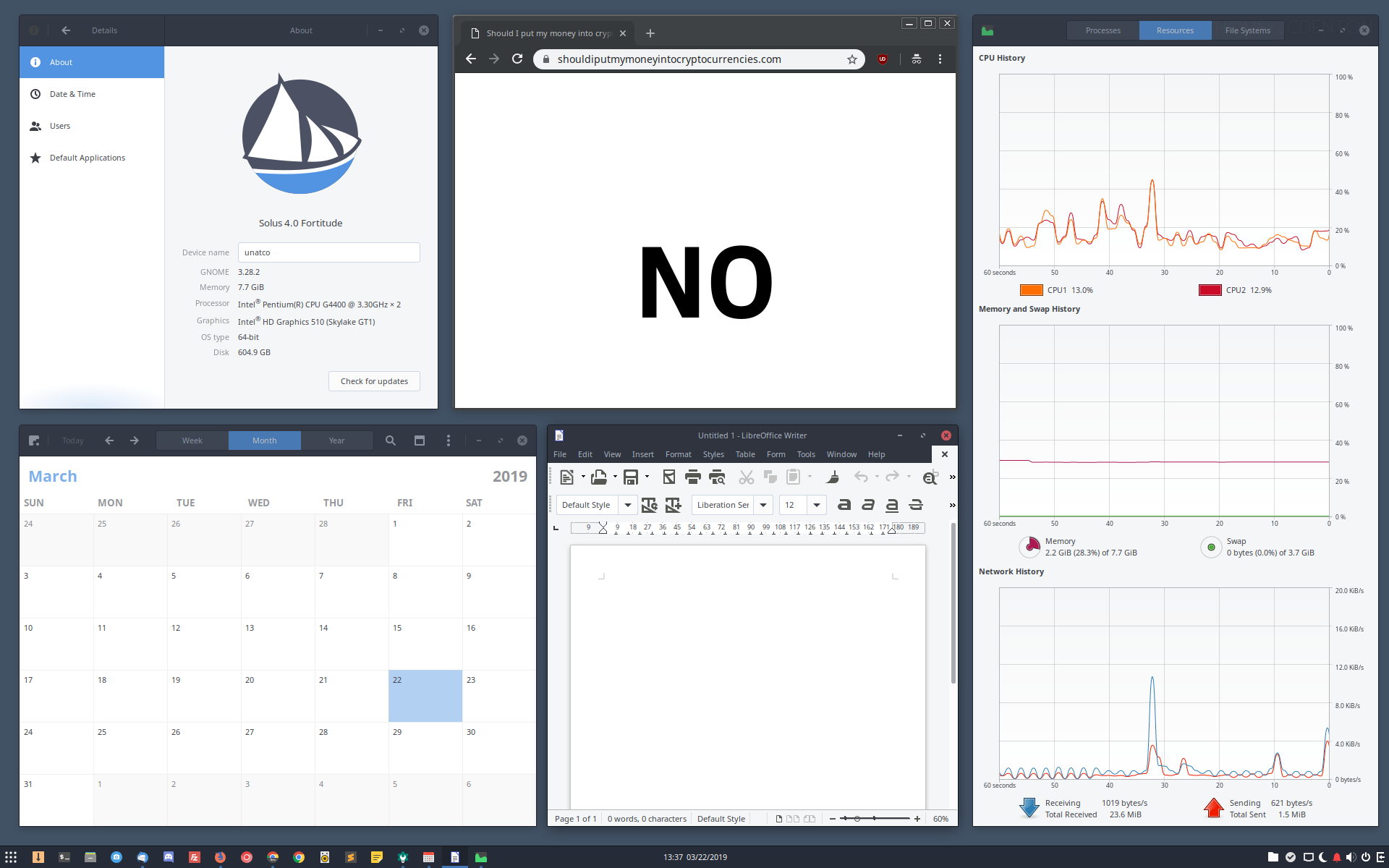 Looking great. Very consistent. Only Chrome sticks out a bit but that?s because I use the ?Classic? theme and not the GTK+ version.
Looking great. Very consistent. Only Chrome sticks out a bit but that?s because I use the ?Classic? theme and not the GTK+ version.
Budgie looks a bit like GNOME but the good thing is that it doesn?t feel like GNOME.
Animations are fluid and timed just right. Snapping windows to the corners never felt more natural. Pinning apps to the taskbar is as easy as it should be. The list goes on and on.
Budgie is beautiful and functional by design. Simplicity is king. And since everything is already nice and dandy out of the box I have more time to concentrate on the things that matter: my work flow.
Thousands Of Great Applications
As a webdeveloper (shameless ?) and writer I mostly need a plethora of browsers, some code editors and lots of office-related software.
The following must-have programs either come pre-installed or can be added via the package manager or the command line: LibreOffice, Ghostwriter, Gnote, Sublime Text 2/3, All Chrome variations (stable, beta, unstable), Firefox, Thunderbird, Filezilla, Git and Nextcloud
That?s pretty much all I need to work on my own and my client?s projects. I also use Discord to communicate with my favorite band Die Lillis.
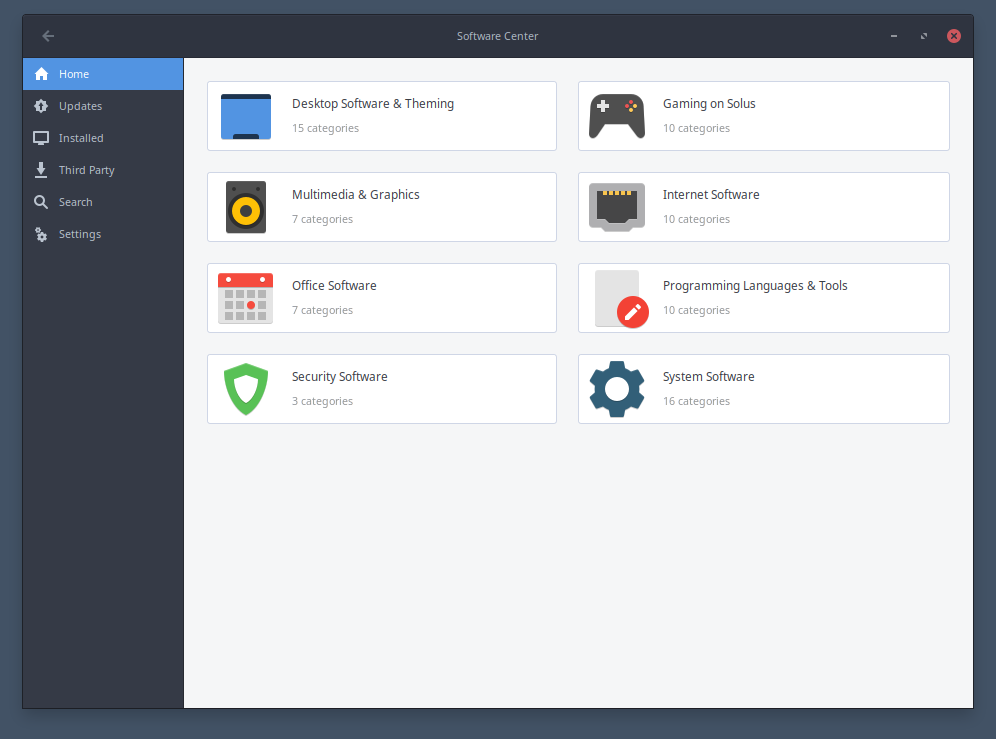 A very tidy ?software center?. I prefer using the terminal to install software though.
A very tidy ?software center?. I prefer using the terminal to install software though.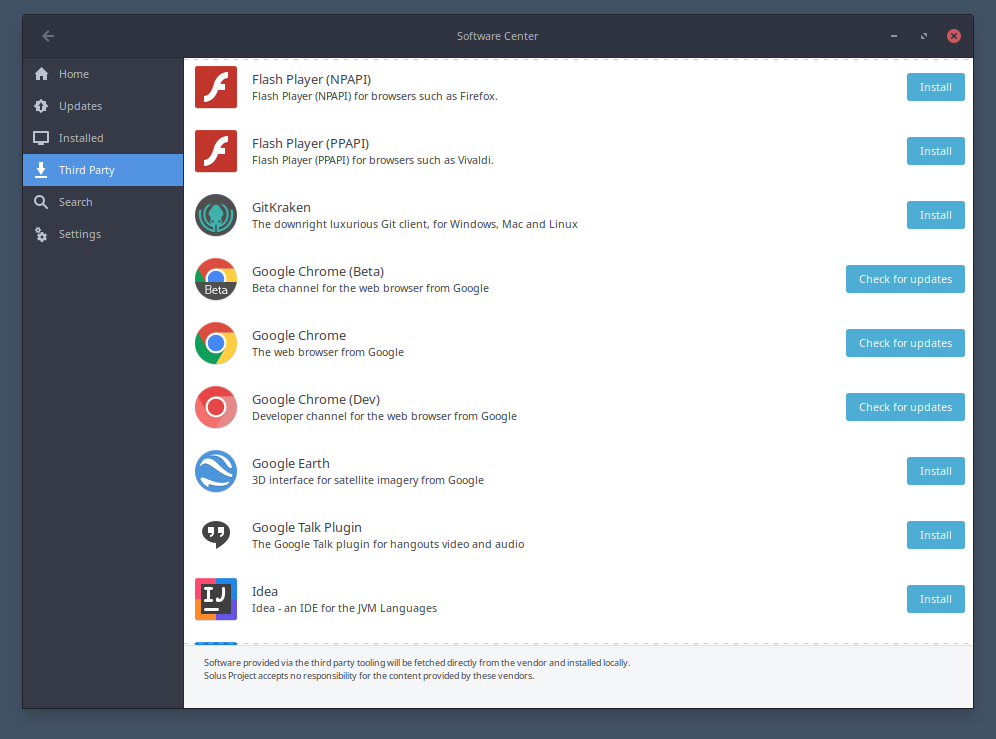 Third party applications can be (automatically compiled and) installed as well within the software center?
Third party applications can be (automatically compiled and) installed as well within the software center?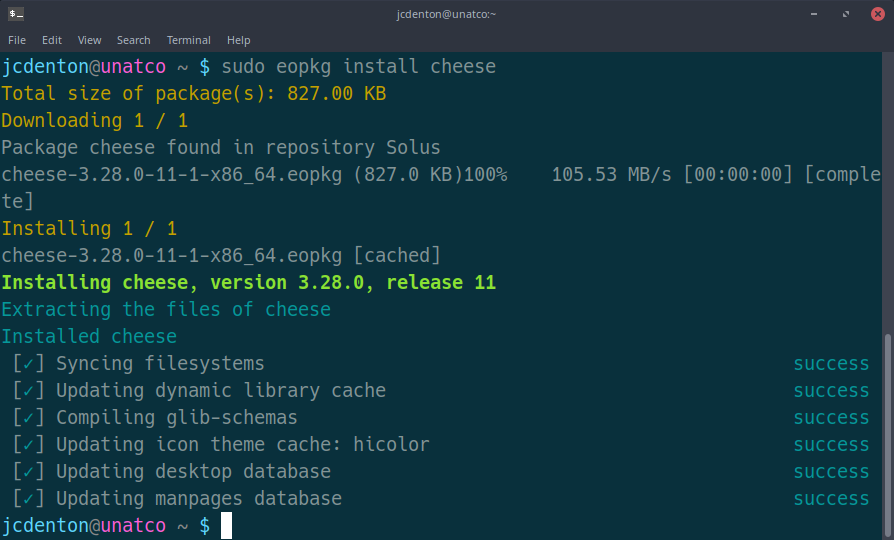 Installing the ?cheese? webcam app via the terminal.
Installing the ?cheese? webcam app via the terminal.
The cool thing about Solus is that there are quite a few very nice integrated tools that make my life as a developer a thousand times easier than I?m used to.
Many of these are originally Gnome applications, e.g. the Screenshot applet or Baobab, the disk usage analyzer that works without JAVA dependencies.
Some are homebrew programs that integrate organically with Solus + Budgie.
Raven, a smart sidebar feature I had seen on MacOS 10.9 ?Mavericks? first a few years earlier, is an unobtrusive and very handy tool which I use quite a lot to check the calendar or adjust sound settings. (Pulseaudio is integrated nicely which I?ve not seen done before. I?m more into ALSA normally but since Pulseaudio works surprisingly well I don?t complain.)
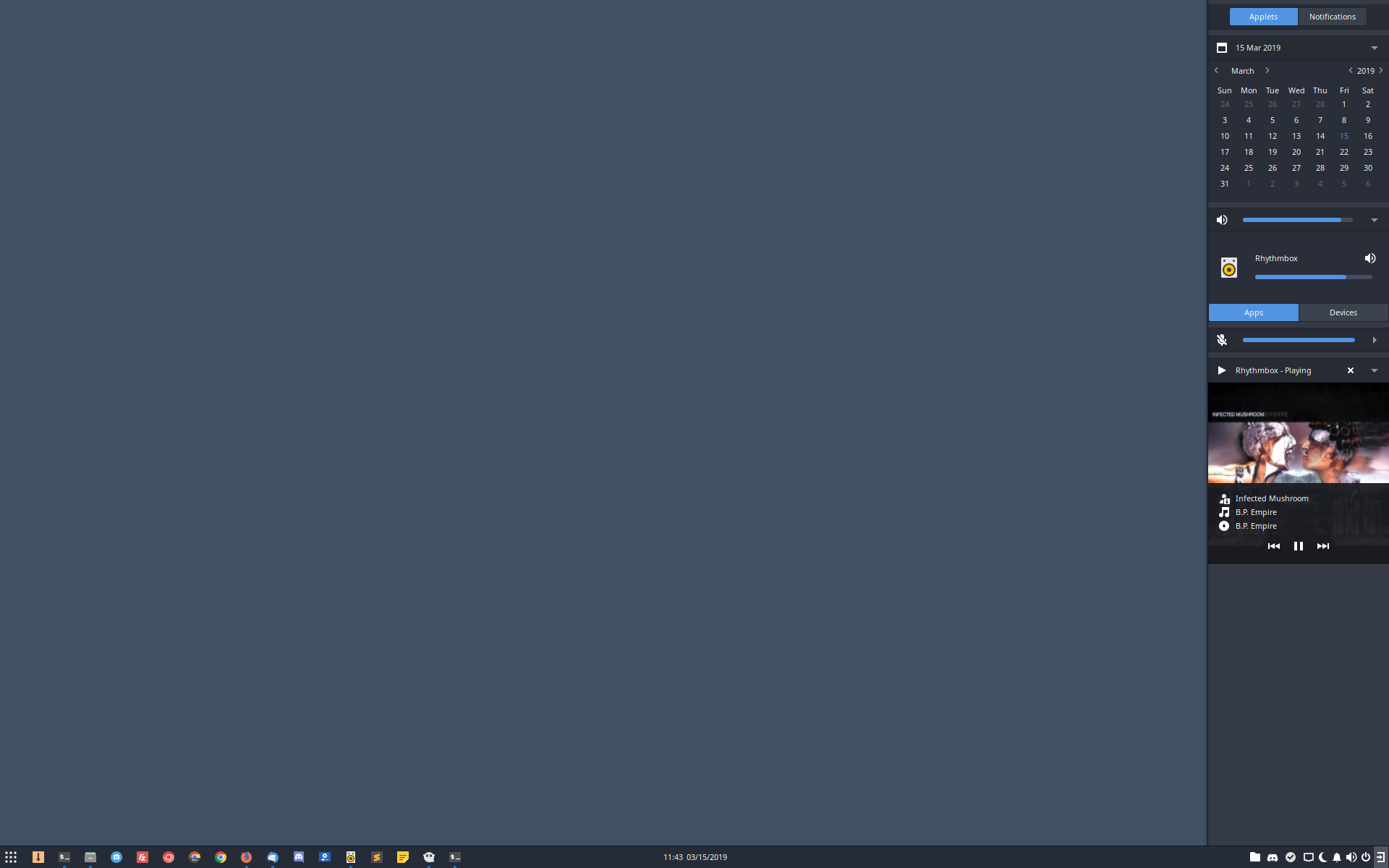 My boring desktop sans my beloved conky overlay. I deactivated it to properly show the Raven sidebar on the right.
My boring desktop sans my beloved conky overlay. I deactivated it to properly show the Raven sidebar on the right.
Another tool I like (but did only need once) is DoFlicky, the Solus way of installing proprietary hardware drivers.
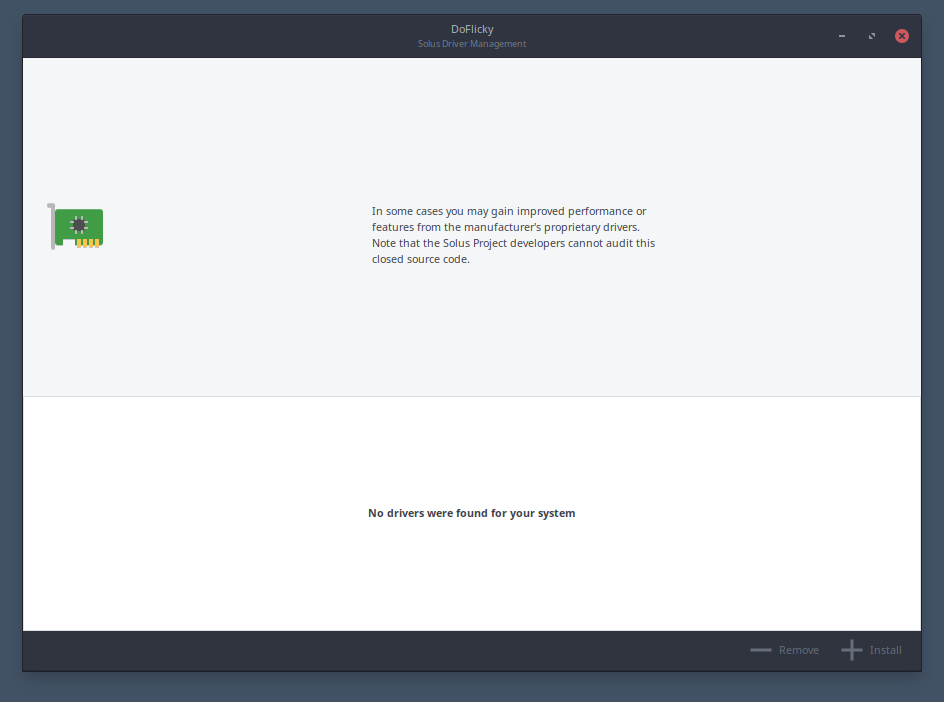 On my G4400 with Intel HD graphics there are no proprietary drivers available. On my good old Thinkpad I had to install proprietary WiFi drivers in order to connect to my router.
On my G4400 with Intel HD graphics there are no proprietary drivers available. On my good old Thinkpad I had to install proprietary WiFi drivers in order to connect to my router.
It?s easy to use and in the one instance I needed it, it worked just fine. I had to install some Intel blob driver to get the WiFi to work on my Thinkpad Edge 13. Nothing special but heaps of distributions make this a lot harder than Solus.
Simple (And Fast) Package Management
The eopkg package manager is easy to use and has not failed me during two years of regular usage.
Getting used to it takes maybe a week. It doesn?t matter if you used apt(-get) or pacman before. With eopkg you?ll get the job done quickly and efficiently.
Rolling Release Rampage
While I dreaded updating (or dist-upgrading via apt) my old systems due to regular breakages, I now look forward to the weekend and I?m totally relaxed as well.
Every Friday a new batch of improvements just magically appears within my software center and so far none of the upgrades delivered via the rolling release model have impaired my workflow.
I had some experience with other rolling release distributions, mainly Arch and Arch-based systems like Manjaro. But especially Manjaro was a nightmare to maintain; those bad experiences made me very, VERY reluctant of actually using a rolling release distribution as my daily driver.
My doubts were proven unnecessary at least one hundred times already, literally.
Every Friday or Saturday I type sudo eopkg up into my terminal and usually it takes around two minutes or less to update.
That?s it. No hair-pulling, no keyboard-biting, zero headaches so far.
Solus has dedicated developers who know what they?re doing.
Putting The Fun Back In Personal Computing
I?ve installed Solus on my main machine but also on another office PC (Haswell chipset) and on my ?vintage? Thinkpad Edge 13 (very early i3) from 2011.
Solus? Just works. Budgie? Just works.
The user experience doesn?t vary really although my Thinkpad is now beginning to show its age. But thanks to another cheap SSD I can still use it, even professionally. Many clients wonder why I don?t upgrade at least my notebook since it?s so old. Why should I? It still gets the job done, mainly presenting my work to said clients. It?s quite amazing if you think about it; my good old Thinkpad has less computing power than most mid-range smartphones nowadays.
Solus doesn?t stand in the way all the time and while that?s something any sane person would expect from a desktop operating system, only a handful of Linux distributions and commercial operating systems do it this well.
I?ve never been happier as a Linux user.
And, that?s what surprised me, I don?t miss the good old times of using Xubuntu 12.04 ? in fact, I installed it in a virtual machine a few weeks ago out of curiosity. Needless to say, I wasn?t impressed. At all.
Xfce is still in my heart, though. I enjoy using it whenever I boot up my OpenBSD box. (?? Installing OpenBSD 6.4 in a virtual machine)
Anyway, due to Solus + Budgie I?ve learned that rolling distributions can be stable, nice to look at and fun to use. Solus does almost everything right. A powerful workhorse that appeals to novice users and professionals alike.
It?s what MacOS could?ve been if Apple?s greed had known any bounds within the last decade.
I rarely use my MacOS-powered Mac Mini anymore, mostly for testing obscure webdevelopment stuff with Safari.
I?m very thankful for Solus but you might have guessed that already. I?m still addicted to using Linux-based operating systems but my distro hopping addiction has been cured. For now.
PS: If You Like Budgie But Not Solus?
 CC-BY-SA-4.0. Original work by Yuri Henrique, modified by Solus.
CC-BY-SA-4.0. Original work by Yuri Henrique, modified by Solus.
Budgie without Solus?!
There a quite a few Linux distributions that use the Budgie Desktop environment to power their distribution.
I didn?t test any other distribution with Budgie but maybe that?s something for you to try out.
The distrowatch.com website lists them all as far as I know.
A few of those projects seem to be built to last at least a few years:
- Ubuntu Budgie
- Manjaro Budgie
- SparkyLinux
Supporting Solus
The Solus project has a Patreon: https://www.patreon.com/solus
Supporters get the satisfying feeling of helping one of the best (and most innovative Linux distributions that ever saw the light of day) to prosper; and early access to the Solus KDE/Plasma ?testing? ISO.
You can also:
- Help answering questions on https://www.reddit.com/r/SolusProject
- Or in the official forums: https://discuss.getsol.us/
- Report bugs here: https://dev.getsol.us/
- Help developing Budgie here: https://github.com/solus-project/budgie-desktop
- Tell your open-minded friends to give Solus a try
What do you think about Solus? Or Budgie. What has your experience been like after a few months of using it as a daily driver? What would you like to see improved in the future?


